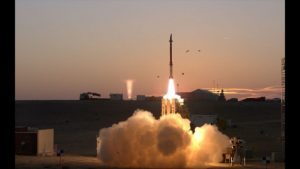Senior air force officer says Jewish state still vulnerable to attack, but multi-tiered system will put it ‘one step ahead’ of enemies
Israel’s David’s Sling anti-missile battery will go operational within the next two weeks, providing the finishing touch of the Jewish state’s multi-tiered missile defense array, a senior Israeli Air Force officer said Monday, like reported by timesofisrael.com .
The David’s Sling, also known as the Magic Wand, will make up the middle tier of Israel’s multi-layer missile defense capabilities, and with it, Israel hopes to close the gaps in its missile defense capabilities, said Brig. Gen. Tzvika Haimovitch, head of the army’s Aerial Defense Command.
Haimovitch did not give an exact date for the system’s deployment, but said on Monday afternoon that it should occur “around two weeks from today.”
However, Haimovitch stressed that even with the new missile defense system, Israel is still vulnerable.
The David’s Sling gives the Israel Defense Forces “more capabilities and more effectiveness,” he said, “but it’s never enough. It’s not hermetic.”
The lowest layer is the Iron Dome system, capable of intercepting short-range rockets and mortar shells like those that have been fired at Israel from the Gaza Strip or from southern Lebanon. And at the top are the Arrow 2 and Arrow 3 systems, which are intended to engage long-range ballistic missiles.
David’s Sling is aimed at filling the gap between these systems.
“One of the threats against us is heavy rockets, not Katyushas or Grads, which can travel 25 miles (40 kilometers), but things that can travel several hundred kilometers,” said Uzi Rubin, an expert on missile defense systems who is considered the father of the Arrow program.
For examples, Rubin offered the Iranian Fateh 110 and its Syrian equivalent, the M600. “There are also things like air-to-ground weapons, which act like missiles — the David’s Sling needs to intercept those too,” Rubin said on Monday.
The Fateh 110 and M600 each have a range of approximately 190 miles (300 kilometers) and can carry a half-ton warhead. They are both considered fairly accurate, though to what extent is a matter of debate, according to a US Congressional Research Service report.
According to US military officials, these missiles have seen repeated use during the Syrian civil war. And since 2010, Israeli officials have said that Syrian President Bashar Assad has been giving M600 missiles to Hezbollah.
“A 300-kilometer range from Lebanon — that covers the entire country,” Rubin said. “Look at a map and measure.”
Threats like the M600 “are beyond the capabilities of the Iron Dome and beneath those of the Arrow,” he said.
With a reported range of 40-190 miles (70-300 kilometers), that is where the David’s Sling will come in.
The Defense Ministry deemed the system ready for use in December 2015. The IAF began receiving components of the system in March 2016 and has since been putting the battery through its paces. In January, the David’s Sling passed additional levels of testing.
Also in January, the IAF received the Arrow-3 system, an updated version of the missile defense battery, which has been deployed in Israel since 2000.
The soon-to-be-deployed David’s Sling, the Arrow-3 system and recent improvements to the Iron Dome have all been part of the army’s “huge buildup” of air defense capabilities, Haimovitch said
This expansion is necessary in light of an “arms race” in the region against Iran and Syria, as well as non-state actors like the Hamas, Hezbollah and Islamic State terror groups, he said.
“The operational David’s Sling, along with the Arrow 2, Arrow 3 and Iron Dome, will deal with this threat,” he said, keeping Israel “one step ahead” of its enemies.
With regard to most types of missile, the military will have overlapping coverage, he said, giving “two solutions for each threat.”
According to Haimovitch, the David’s Sling will provide protection for “most of our homeland.” He would not expand on what specific areas would be covered by the missile defense battery and which regions would be vulnerable.
The officer’s reticence should be expected, Rubin said.
“That’s something that Hezbollah would like to know too,” he said, with a laugh.



